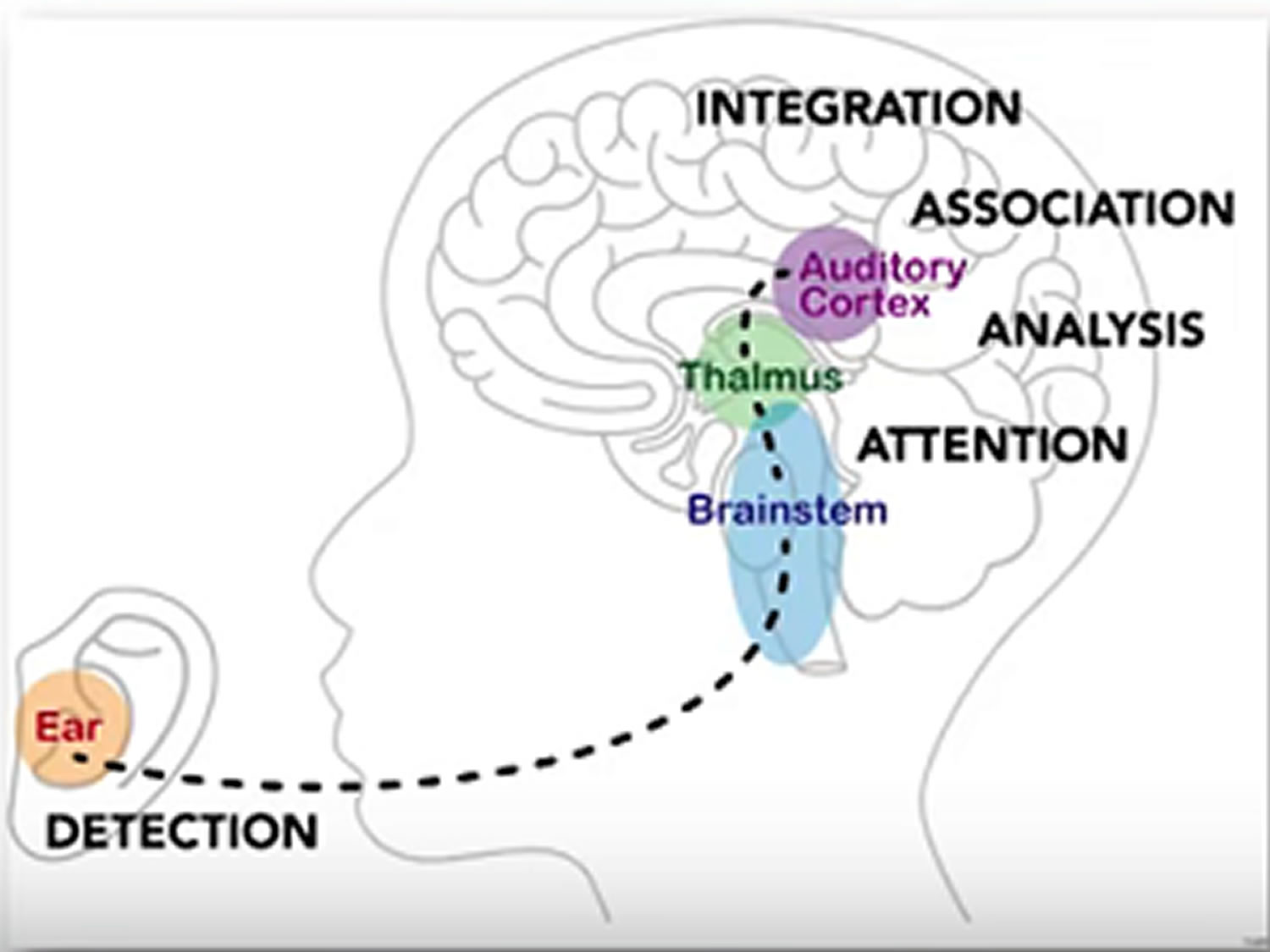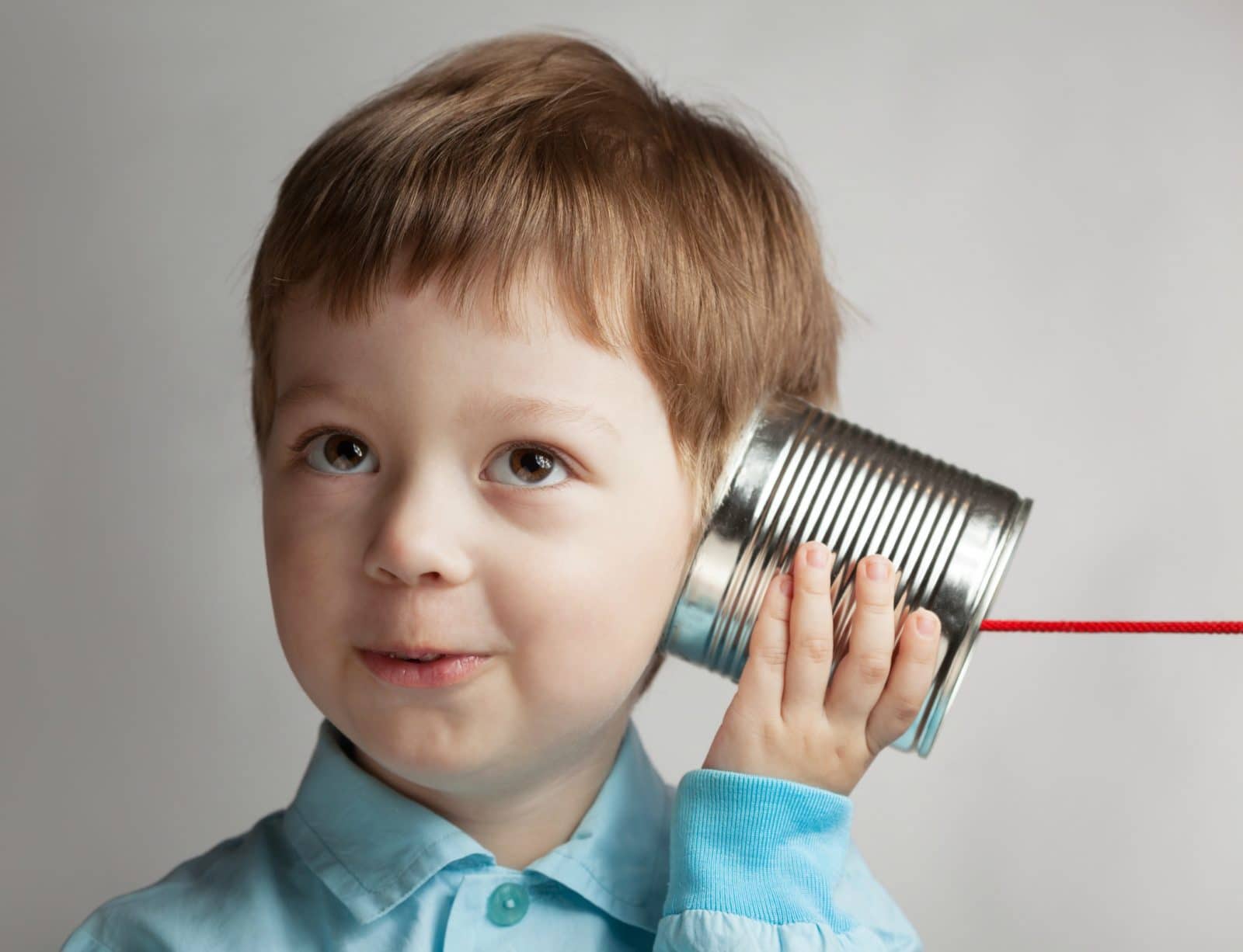

Change the tone of voice throughout a direction, making sure you stress keywords or direction. Use transition words or phrases such as “ready?” or “here we go.” Reduce verbal directions by instead giving slow, simple ones that incorporate spacing between from one to the next direction. Rather than using oral language to get a concept across, try focusing instead on communication through sensory means (hand gestures, visual means, paper handouts, manipulatives). These solutions will make communications between you and this person much more fluid and easier to understand. Here are some ideas for helping to reduce some of the issues a sufferer of APD struggles with. Solutions for Auditory Processing Disorder Now that we’ve discussed some of the major symptoms of Auditory Processing Disorder, let’s look at some suspected causes. Video Simulation of APD Symptoms performing a task. Have no issues remembering non-verbal situations such as music or background sounds, but are unable to cognitively respond to orally given tasks. Have a hard time understanding someone who speaks fast or in longer, more complex sentences. Maintain that repetition is essential to them because they are unable to process what is being said may ask “what?” or other repetitive questions (“Why?”). Become too focused on something that they ignore someone speaking directly to them. Have issues misinterpreting verbal direction given, unable to follow sequential steps. Find it extremely difficult to focus especially on presentations, speeches, or classroom lectures. Have difficulty determining the origin of a noise/sound or someone speaking. Be easily distracted by noises in the background.  Have trouble confusing words that are similar in pronunciation can mispronounce, leave out syllables, or misspell closely related-sounding words (colt/cult), (ask/axe). Be unable to understand figures of speech takes words, phrases, or jokes literally rather than metaphorically. Have difficulty processing ideas or thoughts and then explaining to them when asked to (slow processing skills). While some symptoms of APD may resemble symptoms of other disorders such as ADHD, ADD, or Dyslexia, here is a comprehensive list detailing what a victim of Auditory Processing Disorder may be experiencing. So, what is APD? Let’s take a look at the symptoms, causes, and treatment options. Boys are at greater risk of development than girls. Commonly during childhood, but can happen at an older age. Common in someone already diagnosed with dyslexia or ADHD. Statistics show that 2%-7% of children suffer from APD. Who is most likely to suffer Auditory Processing Disorder? If something sounds similar to another word, their brains will confuse the word spoken with another word.įor example, if a parent asks their child “what number comes after three,” the children with APD may have heard, “What a bummer this one’s not free.” The words “number and bummer,” “three and free” are what a child with APD will audibly mix up. Someone who suffers from this will mix up words based on their sounds. APD is when the brain is having a hard time “hearing” words like it normally should. It is important to note that APD is not a learning disorder, a cognition disorder, or a loss of hearing issues. Schools for Students With Learning Disabilities. Famous People with Learning Disabilities. Tips For Foreign Language Learners With Dyslexia. 5 Questions to Ask Your Child’s Special Education Teacher. Facts About ADHD and 10 Celebrities with the Condition. The Impact of Learning Disabilities on Social Skills. Signs and Symptoms of Learning Disability. Learning Disability, Dyslexia, ADHD Know Your Rights. Dealing With an ADHD Diagnosis as an Adult. Why Participating in a Sport Can Help Children with ADHD. Learning Disability Testing and Assessment.
Have trouble confusing words that are similar in pronunciation can mispronounce, leave out syllables, or misspell closely related-sounding words (colt/cult), (ask/axe). Be unable to understand figures of speech takes words, phrases, or jokes literally rather than metaphorically. Have difficulty processing ideas or thoughts and then explaining to them when asked to (slow processing skills). While some symptoms of APD may resemble symptoms of other disorders such as ADHD, ADD, or Dyslexia, here is a comprehensive list detailing what a victim of Auditory Processing Disorder may be experiencing. So, what is APD? Let’s take a look at the symptoms, causes, and treatment options. Boys are at greater risk of development than girls. Commonly during childhood, but can happen at an older age. Common in someone already diagnosed with dyslexia or ADHD. Statistics show that 2%-7% of children suffer from APD. Who is most likely to suffer Auditory Processing Disorder? If something sounds similar to another word, their brains will confuse the word spoken with another word.įor example, if a parent asks their child “what number comes after three,” the children with APD may have heard, “What a bummer this one’s not free.” The words “number and bummer,” “three and free” are what a child with APD will audibly mix up. Someone who suffers from this will mix up words based on their sounds. APD is when the brain is having a hard time “hearing” words like it normally should. It is important to note that APD is not a learning disorder, a cognition disorder, or a loss of hearing issues. Schools for Students With Learning Disabilities. Famous People with Learning Disabilities. Tips For Foreign Language Learners With Dyslexia. 5 Questions to Ask Your Child’s Special Education Teacher. Facts About ADHD and 10 Celebrities with the Condition. The Impact of Learning Disabilities on Social Skills. Signs and Symptoms of Learning Disability. Learning Disability, Dyslexia, ADHD Know Your Rights. Dealing With an ADHD Diagnosis as an Adult. Why Participating in a Sport Can Help Children with ADHD. Learning Disability Testing and Assessment. #COGNITIVE AUDITORY PROCESSING HOW TO#
How to make websites more accessible and inclusive for people with dyslexia.6 writing tips for students with dyslexia and ADHD in college.Trevor Noah’s Journey with ADHD: From ADHD Diagnosis to Success.Apple iOS 15 Handheld Live Text OCR Readers for Dyslexics & LD.Effective Behavioural Tips to Adapt for ADHD Treatment.Successful Job Interview Tips for Individuals with ADHD.Google Classroom ™ and Online Teaching for Special Education.How to Incorporate Assistive Technology in the classroom.Famous People and Celebrities with Learning Disabilities and Dyslexia.How To Overcome Stigmas & Build Confidence.

How ADHD, autism, and dyslexia can affect one’s ability to learn.Dyslexia, ADHD and Learning Disabilities Facts.







 0 kommentar(er)
0 kommentar(er)
